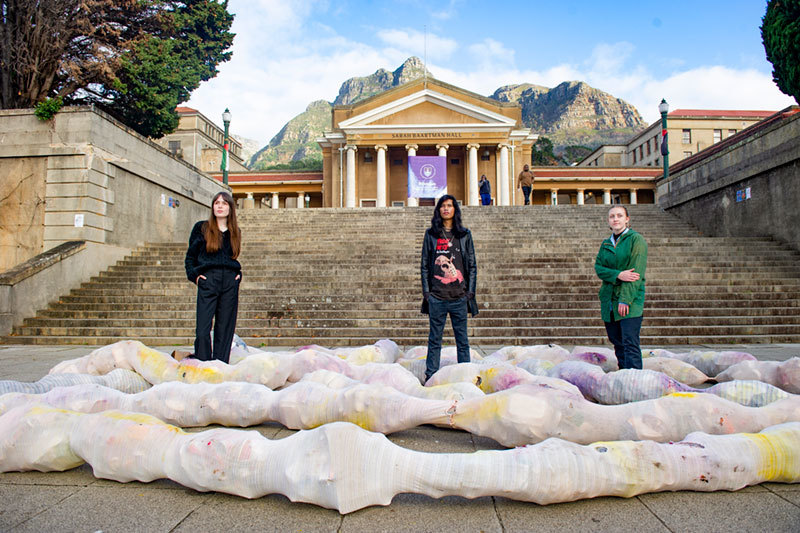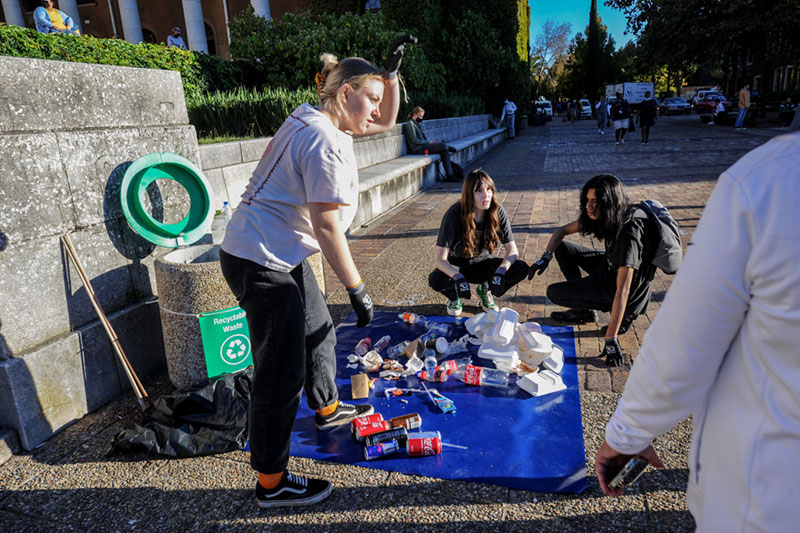Giant fabric ‘intestine’ promotes culture of recycling on campus
13 May 2022 | Story Niémah Davids. Photos Lerato Maduna. Voice Cwenga Koyana. Read time 5 min.
If you’ve been to upper campus recently, then you’ve likely seen the giant 90 m sculpture on the plaza and wondered what it’s all about.
The work of art has been created by a group of environmentally conscious University of Cape Town (UCT) students in a unique effort to increase awareness on the benefits of recycling and to inspire positive change among the campus community.
Constructed out of mutton cloth, the large sculpture referred to as “the intestine” has been stuffed with three weeks’ worth of UCT’s contaminated waste bags and one month’s worth of cleaned recyclable waste. The intestine also contains splashes of colour to indicate the location of the clean recycled waste (in green) and the contaminated waste (in yellow and purple).
The project forms part of the Khusela Ikamva Sustainable Campus Project – a transdisciplinary collaborative effort initiated to set the university as a “living lab” and to maximise its reach and impact. The project is also a key enabler in transforming UCT’s institutional fabric to reduce its ecological footprint, support the university’s environmental sustainability strategy and achieve a more sustainable campus.
“Our project intends to comment on UCT staff and students’ recycling consciousness and to challenge the university to find ways to improve [its] recycling system.”
“Our project intends to comment on UCT staff and students’ recycling consciousness and to challenge the university to find ways to improve [its] recycling system,” said group member Kayleigh Cornish.
A unique project
The project, Cornish said, is inspired by a series of photographs by photographer Chris Jordon, which sadly captured how birds consumed plastic.
“From Chris’s photographs we were inspired to create this intestine filled with waste and bursting at different points to illustrate and capture the violent effect pollution has on wildlife,” she said.
The project aimed to pique students and staff interest as they entered the plaza and provide them with a surreal and enlightening experience on pollution. Cornish said the sculpture generated questions and debate – especially during the setup phase on Tuesday, 10 May. And students were fascinated and reacted positively when the group explained their reasons for creating it.
Promoting a recycling culture
Cornish created the sculpture in partnership with fellow students Danielle du Plooy and Shahir Singh. The trio are students at the Michaelis School of Fine Art and hope the project will promote a culture of recycling and inspire change across campus.

“As a university, we need to ensure that there are enough bins around campus and that the general waste and recycling waste bins are coupled up. We also need to educate students and staff on recycling,” she said.
More than that, it’s important that bins are clearly marked and that waste collection companies always use the right bags. These suggestions, she added, will improve the recycling culture and reduce the amount of waste in and around campus and the city.
Next steps
Manfred Braune, the director of environmental sustainability at UCT, said he is impressed by the project.
“Art is an important and effective way to create awareness about our many environmental challenges.”
“Art is an important and effective way to create awareness about our many environmental challenges. Well done to these students for their creativity and passion that is so evident in this excellent art installation,” he said.
Currently, the students are in conversation with Braune on how to use the project on other parts of campus, to extend its life and raise further awareness on the importance of recycling. Once the work has run its course, Cornish said the contaminated waste will be returned to UCT, and the recyclable waste will be recycled. The mutton cloth will be washed and donated to UCT’s Art Department to be used as scrap fabric for cleaning.
The student trio wish to thank the following UCT staff members for their assistance with this project: Reggie Mayman, Noelene Le Cordier, Nicoli Nattrass, Manfred Braune, Akhona Mazingi, Stanley Witbooi and Bernard Soules.
 This work is licensed under a Creative Commons Attribution-NoDerivatives 4.0 International License.
This work is licensed under a Creative Commons Attribution-NoDerivatives 4.0 International License.
Please view the republishing articles page for more information.
Listen to the news
The stories in this selection include an audio recording for your listening convenience.























































































































































































































































































































































































